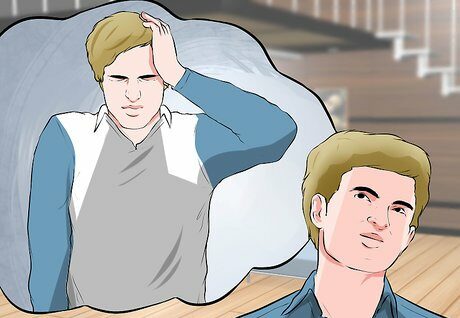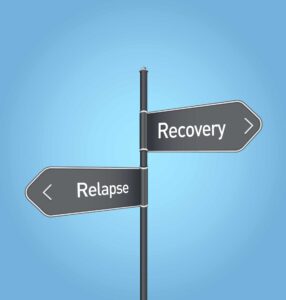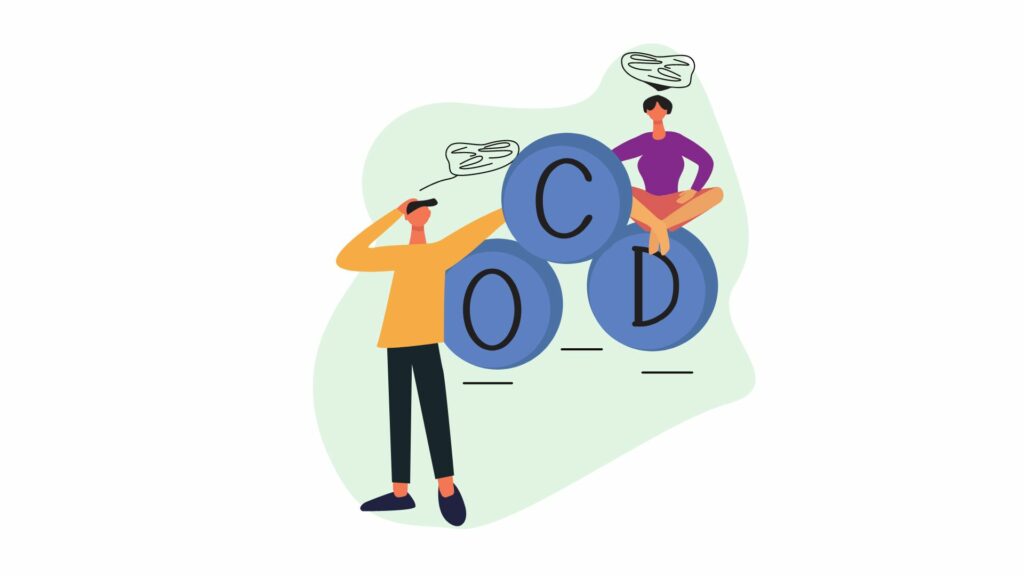The title says it all. This is a blog article about dealing with “OCD relapse” – that is, how to prevent and handle the return of obsessive thoughts and compulsions after someone has achieved temporary relief from their symptoms through therapy or medication. So, in this article, we are going to discuss what OCD relapse is, how long it lasts, and how you can prevent it
Contents
What is An OCD Relapse?
 An OCD relapse is when a person’s symptoms return after being in remission. It can be a scary experience because you may feel like your OCD is back with a vengeance. However, it’s important to remember that an OCD relapse isn’t permanent and that you can get through it.
An OCD relapse is when a person’s symptoms return after being in remission. It can be a scary experience because you may feel like your OCD is back with a vengeance. However, it’s important to remember that an OCD relapse isn’t permanent and that you can get through it.
Many factors can contribute to relapse, including:
- The person’s mental and emotional state before relapse
- The environment around the person during relapse
- The type of addiction relapse is occurring
- The person’s history of relapse
It’s important to remember that being able to recognize the signs of relapse does not mean that you are powerless. It does, however, mean that you may need additional help and support for recovery. The sooner a person can recognize that he or she has relapsed, the sooner he or she can take action to stop their activity and begin the process of recovering.
How Long Does OCD Relapse Last?
OCD relapse can last anywhere from a few days to a few months. The average relapse lasts approximately two weeks, but it can last up to six weeks. Symptoms of OCD relapse typically include intrusive thoughts, feelings of terror, and repetitive behaviors. It is important to remember that relapse is not indicative of failure. Rather, it is a common occurrence during the early stages of treatment for OCD. OCD is a chronic and disabling condition that may be accompanied by depression.
OCD can enhance the risk of developing a major depressive disorder. But whether or not this causal relationship exists is unknown. The precise mechanisms underlying this link are not completely understood. But OCD likely acts as a stimulus for developing a major depressive disorder. In individuals with obsessive-compulsive personality traits. There is an increased likelihood of developing depression compared to individuals who do not have these traits.
Signs of a Potential Relapse
Relapse is a common occurrence in addiction treatment, and it can be scary. It’s also an opportunity to get back on track. But how do you know if you’re headed for a relapse? Here are some warning signs:
Feel out of control
When you relapse, it can feel like your usual behaviors have taken over again. You may find yourself reaching for drugs or alcohol even when you don’t want to. This is because relapsing addicts often feel desperate and powerless to stop themselves.
Feel ashamed or guilty
Relapse can lead to feelings of guilt and shame. You may start to believe that you’re a bad person because of your addiction, or that you deserve to relapse because of what you’ve been through in treatment. This is a dangerous mindset, as it can lead to self-hatred and depression. Talk to your doctor if these feelings seem overwhelming or continue after treatment has ended.
Get cravings
Addicts usually crave their drug at first after going off it for a while. This means that abusers may feel an urge to re-use or pick up their drug when they’re off of it. If this happens, you should talk to a doctor right away. They will know what to do if you have an urge to use it. If your cravings don’t subside after a few days, visit your doctor, too.
Stress and anxiety
If your OCD has been causing you significant distress, chances are high that you’ll experience those same feelings again if your symptoms return. You may feel like there’s no escape from the thoughts or behaviors that trigger your OCD, and you may even experience bouts of panic or stress when confronted with reminders of your condition.
How to Deal With an OCD Relapse
 Relapse is a common problem if you have obsessive-compulsive disorder (OCD). A relapse can happen when your symptoms start to come back after you’ve been able to control them for a while. Here are some tips on how to deal with a relapse.
Relapse is a common problem if you have obsessive-compulsive disorder (OCD). A relapse can happen when your symptoms start to come back after you’ve been able to control them for a while. Here are some tips on how to deal with a relapse.
During this time, you should avoid any stressors that could trigger your OCD symptoms. After taking a break, try reintroducing some of your old OCD rituals one at a time, starting with the ones that are easiest for you. If those rituals don’t cause any problems, continue adding more difficult rituals slowly until you reach the level of severity that was typical before your relapse. At this point, you should be able to function normally once again.
You may want to revisit the suggestions given in the first place such as the cognitive-behavioral approach to your OCD. Or you might have considered ERP. CBT and ERP are considered the best effective methods for OCD. And this can actually help you recover from your condition.
You should also try to get enough sleep in order to avoid compulsions and obsessions. For this, you can try keeping your bedroom doors closed when you sleep and getting rid of certain items in your home that could be triggering stimuli. Also, try avoiding screen time or taking a shower right before bed can help you get better sleep.
If you’re feeling overwhelmed by your OCD symptoms, it can be helpful to take breaks from your OCD rituals. This means not doing anything that falls under obsessive-compulsive disorder for a set period (usually a few days).
Prevention of Relapse
 Relapse is one of the most frightening things that can happen to a recovering addict. Relapse means that an addict has gone back into using drugs or alcohol and this can be very dangerous for their health and well-being. There are many things that you can do to help prevent relapse, but it is important to know the signs and symptoms of relapse so you can take the right steps.
Relapse is one of the most frightening things that can happen to a recovering addict. Relapse means that an addict has gone back into using drugs or alcohol and this can be very dangerous for their health and well-being. There are many things that you can do to help prevent relapse, but it is important to know the signs and symptoms of relapse so you can take the right steps.
Stay informed about relapse prevention techniques. There are a lot of different resources out there on relapse prevention. So you must find what works best for you. Here are some tips to help you stay safe during your recovery:
- Stay positive– Relapse prevention is all about staying positive and believing in yourself. If you start thinking negatively about your ability to stay clean, then it will be much harder for you to succeed. Remember, you have been through a lot of hard work and progress in your recovery so far – don’t let anything undo all of that progress in a single night or weekend!
- Get plenty of exercises– Exercise has been proven to be very important in helping people stay clean. Being physically active helps you to reduce your cravings for alcohol and helps you with achieving better sleep habits. You should also make sure that you are eating a healthy diet.
- Learn to meditate and/or do yoga– It sounds dramatic, but it can help an addict realize the value of life when they can take time out of their day to reflect on what they have accomplished and get back on track, faster than someone who is not in recovery.
- Do what makes you feel good– Your goals may change throughout your addiction. If the first step doesn’t work or if something else comes up, don’t give up. Try another method and go back to the first step if you need to. The point is that there are effective and proven methods that can help you get clean. So don’t let fear of failure keep you from trying.
- Focus on recovery one day at a time– This means forcing yourself to do what is necessary every single day of your sobriety. No matter how hard it may be or how tempting it may be to give in to old habits and self-sabotage.
- Seek professional help– It may be worth seeking professional help. A therapist can help individuals develop coping strategies, manage their lives, and offer support and encouragement. Therapists can also help individuals with OCD gain some perspective. They can help them realize that the fear associated with their obsession is not accurate, and it does not deserve to be a driving force in their life.
- Learn to “unlearn” once you are in treatment– reef all other measures fail, there may be an opportunity for treatment-free relapse prevention after recovery from OCD. The goal of this type of relapse prevention would be to learn how to unlearn the obsessions and compulsions once they no longer trouble you (which has been achieved through therapy).
Conclusion
Relapse is a common phenomenon that occurs when someone tries to quit smoking, eating junk food, or any other bad habit. It’s important to understand the warning signs of relapse so that you can get help before it becomes too late. As long as you keep your eyes open for these red flags and take action when they arise, you’ll be in good shape to avoid relapsing and maintain your new habits.
If you want more information and want help with OCD treatment. You can contact Therapy Mantra for expert guidance we have a team of highly trained and experienced therapists who can provide you with the tools and skills necessary for overcoming OCD. Our sessions are open to everyone across the globe at affordable rates. Contact us today to schedule an online therapy or download our free OCD treatment app on Android or iOS.


